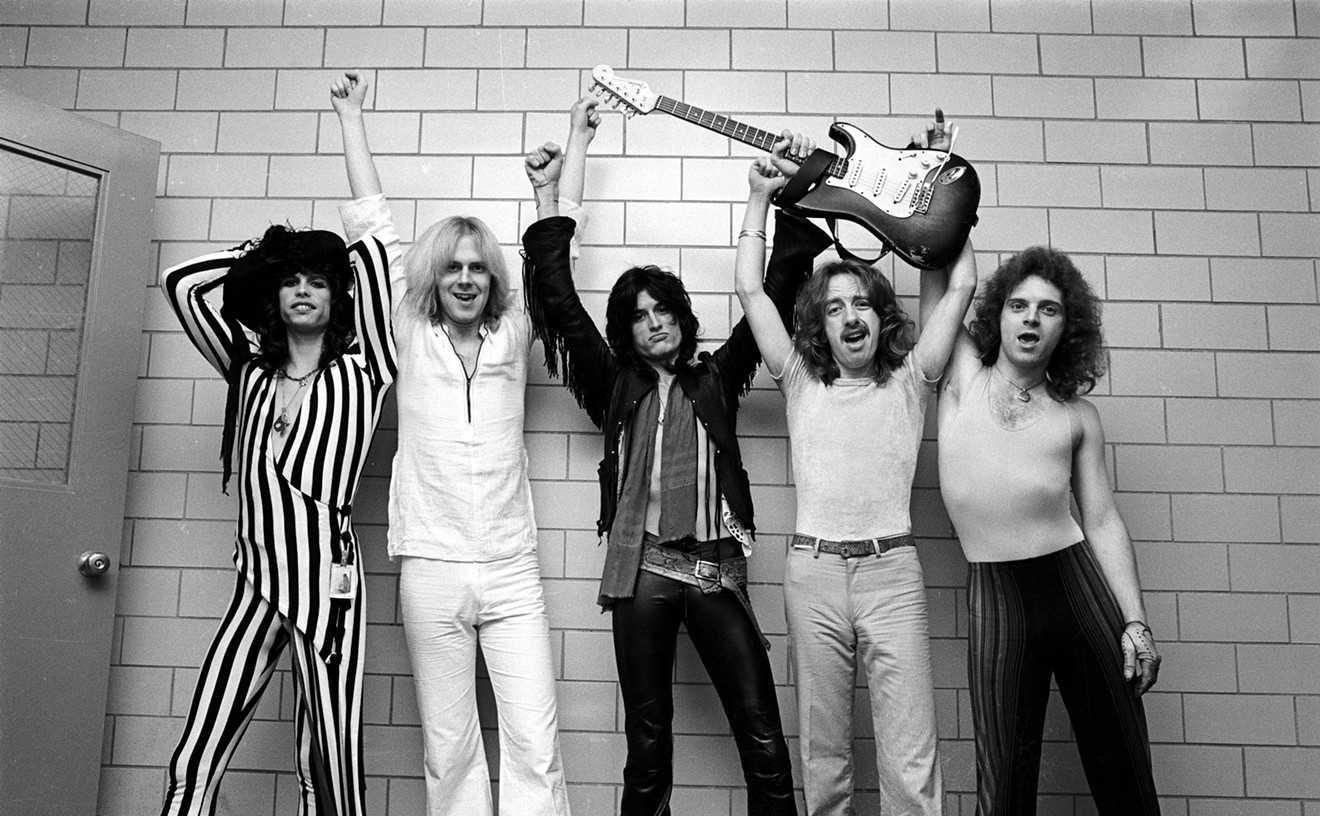"When I see a fighter, like when I hear someone play music, I know right away if the motherfucker has got it or not," he says gruffly, his Austrian accent still strong after four decades in the States.
Aware that the guest at his downtown Manhattan loft is from Phoenix, the keyboard maestro cites ex-champ Michael Carbajal as an example of what he's talking about.
"Like when he came off the deck to hit Humberto 'Chiquita' Gonzalez with the left hook," he says of the memorable 1993 clash between the two mighty mini-flyweights. "Like it was choreographed. All his years of work in that one moment.
"But no matter how long you've been playing, no matter how good you've gotten, you still have to play your rudiments, your exercises. Same in boxing. Boxing is exactly like music--if you don't do it one day, you'll feel it.
"Repetition, jab, jab, jab. Get the right footing, right position, right distance. When I box, this is for me time to think. When you box, you have to think. Same with music."
It's early March in New York City, and Zawinul has just returned from Los Angeles and a trip to the Grammy Awards. His nominated two-CD release, the Zawinul Syndicate's stellar World Tour (Zebra Records), lost in the contemporary-jazz category to Pat Metheny's Imaginary Day.
The 67-year-old Zawinul is taking a short break at home before he and one of his sons, Ivan, fly to Africa for 10 days of seminars and performances. "I'm an official goodwill ambassador for Austria to 16 African countries," he says. "But I really don't come from a culture--the world is my place. I don't listen to black music. I don't listen to music at all, not even my own, after I'm done making it."
During his break from touring, Zawinul has been working out at a Manhattan boxing gym at least twice a week, swimming, tending to business, and, most important to him at the moment, working at his home recording studio on his latest creation.
In music and words, it tells the horrific story of the Austrian concentration camp called Mauthausen. It was a vile place where 122,000 people lost their lives to the Nazi regime between 1938 and 1945.
Zawinul performed the piece live on August 8 before 8,000 people at the site of the death camp, located in a pastoral rural setting a few miles from the Danube. That day marked the 60th anniversary of the camp's opening.
"Mauthausen" is a haunting, disturbing work with deceptively benign folk melodies that Zawinul first improvised, then carefully crafted on his bank of electronic keyboards. The sampled sounds that weave in and out include the screaming of the condemned, barking dogs, crying babies, marching soldiers and other jarring aural images.
For Zawinul, the work marks the most significant achievement of his long career. That in itself speaks volumes.
To say he is one of jazz's all-time greats is a given. His musical vision has been huge, his stew of ideas profound, yet accessible.
Where to start?
Zawinul wrote two of jazz's most beloved, enduring and covered compositions--"Mercy, Mercy, Mercy" for Julian "Cannonball" Adderly in the mid-1960s, and "Birdland," first performed by his band Weather Report, in the mid-1970s.
If he'd wanted to, Joe Zawinul could have crafted a tidy career propelled by the success of "Mercy." And no one would have blamed him if he'd milked Weather Report's reservoir of popularity with "greatest hits" shows after the group disbanded in 1986.
But that's not Zawinul's way.
Like his kindred spirit, trumpet player Miles Davis, Zawinul is one of those musicians who will not, cannot rest on his laurels. He craves new sounds, new experiences, new musical partners. As a result, his band these days--the Zawinul Syndicate--is as alive and vibrant as anything out there.
He has performed with many of the idiom's greats--Adderly, Davis, Dinah Washington, Joe Williams, Wayne Shorter and fellow pianist Herbie Hancock. His keyboard playing is equal amounts of spirit and dexterity. In other words, he's got soul, he's got chops.
One thing that defines Zawinul's greatness is his ability to make his sophisticated music inviting to anyone with an open mind and ear. Take 1977's "Birdland," a tune so catchy that it's still standard fare for the nation's high-school marching bands.
The song starts the Heavy Weather album with a hypnotic seven-note keyboard bass line that grabs the listener by the throat. After several seconds, the rest of the band (sans co-leader Wayne Shorter) kicks in, led by the mercurial Jaco Pastorious, who plays a brilliant bass line on his instrument's high end.
Finally, the masterful Shorter comes in on his tenor saxophone--overdubbed on several tracks playing the same line. Zawinul tosses in some syncopated chords on an acoustic piano. The tension builds. Pastorious resolves the original theme with an impossibly funky line. Surprisingly, the famous "Birdland" theme doesn't kick in until two minutes have passed.
For the remaining four minutes, Zawinul and company tease, cajole, swing--very hard. Eerie voices enter from beneath the music as the composer restates the theme. Hands clap. Zawinul performs a solo that isn't really a solo. The hand-claps speed up as the song fades out. It's an exercise in unbridled joy.
Zawinul's earlier elegiac pieces such as "In a Silent Way" and "Pharaoh's Dance" provided the foundation on which Miles Davis changed modern music in the late 1960s and early 1970s. During that era, he pioneered the use of electronic keyboards as a means to express the endless menagerie of sounds inside his head.
His band these days is difficult to describe. It's easier to say what The Zawinul Syndicate is not: It's not what most people consider "straight-ahead" or traditional jazz. And it's definitely not the so-called "smooth" variety.
In live performances, Zawinul pushes his four much-younger colleagues--a guitarist, percussionist, drummer and bass player--to the limits of their abilities, much like a skilled point guard controls a basketball team.
The Syndicate works with musical themes based on Zawinul's elegant, funky, provocative improvisations that have been codified into composition.
("Improvisation," by the way, doesn't mean making it all up as he goes along. Zawinul's tunes are highly organized affairs, but within whose boundaries his cohorts have much room to show their stuff.)
Those who have reviewed the World Tour CD have devised a variety of ways to discuss its disparate sounds: "world-funk, Afro-Gypsy, electric-trance music"; "high-energy fusion, world rhythms and groovin' jazz"; "percussion extravaganza."
To Zawinul, the labels are meaningless.
"I know what I'm doing, that's all that counts," he says. "And I knew it when I was 7 years old, when I was playing the accordion in Austria by ear, the Gypsy songs. Nothing has changed."
Josef Eric Zawinul was born in Vienna, which is as important a musical city to Europe as New Orleans is to the States. His only sibling was a twin brother who died before his fourth birthday. The Zawinuls were poor, and his parents each worked two jobs to make ends meet. Luckily, he earned a scholarship at the prestigious Vienna Conservatory starting at age 7.
Sitting in his New York City loft more than a half-century later, Zawinul riffs about his childhood:
"Where I come from, anyone can play by the time you're 10, already be a master on your instrument. By the time I was 12, I could sight-read and play, really play. I had the greatest teachers in the world.
"My mom was one of 16 kids from the farm. Every holiday, we'd go to the farm to help my grandparents. Plow with the oxen, everything. We had civil war in the '30s in Austria, economic crisis so bad that nothing in this country compares, not even the Depression. Sometimes nothing to eat, or to drink. A catastrophe.
"My mama was a cook for a famous Jewish doctor--we were Catholic. He sent her to concerts sometimes, because she loved music so much. She had perfect pitch. Never learned music, but could sing like a bird. My dad was a great harmonica player. Played the blues, Austrian folk songs, old Gypsy songs. It all sunk into me, became part of me."
Zawinul long has spoken of searching out musicians who have life experience as well as expertise on their instruments. None is likely to have had more of the former than Zawinul himself, who survived World War II with luck and guile.
"The Russians came in in May of '45," he says. "It was very dangerous. German soldiers hiding in the woods. I greeted the Russians with a white flag and shovel. 'Hello, guys.'
"I got a job, which was to bury dead soldiers, Germans mostly. Sometimes we'd break their medals off to send to the parents. It was no big deal--we grew up like that, bombs and grenades. As long as you live to the next day and you got your family, everything is fine."
But the 13-year-old Zawinul didn't know for weeks after the war ended if everything was fine.
"My mom was in Vienna, and I was in the country. My dad was working somewhere far away. I didn't know then if they were dead or alive. I already lost four or five uncles to the war."
On the second day of the Russian occupation, Zawinul says, he had a close call: "Me and my cousin were angry at everyone, because we had nothing and were starving. We saw a Russian wagon with horses tied to it. We were so hungry. We snuck up and stole a horse. They would have shot us in one second, but they didn't see us. The horse was all beat up. We walked it to the next village, went to the butcher. 'You got to shoot this fuckin' horse.' He did. We got to eat, no bread or nothing. Delicious."
Zawinul says he practiced the piano whenever and wherever he could. He studied the music of his Austrian forebears--Liszt, Brahms and others--as he continued to immerse himself in his region's rich multicultural musical heritage.
In Vienna after the war, the movie Stormy Weather--which included Lena Horne, Fats Waller and Cab Calloway--provided Zawinul with an epiphany. He saw the flick over and over, and resolved to work someday with black jazz musicians in the States. In his early 20s, he started to earn a living playing straightahead jazz in Austria and around Europe, while continuing with his European classical studies.
In 1959, Zawinul accepted a scholarship to the jazz-oriented Berklee School of Music, in Boston. He quit after only a few weeks, and went on the road with trumpet player Maynard Ferguson. That led to a job accompanying the great Dinah Washington, considered by critics to be one of jazz's most influential singers--the female equivalent of Ray Charles.
Washington's gospel-tinged phrasings and tonal variations soaked into Zawinul. His playing attracted the attention of Hall of Fame tenor saxophonist Ben Webster, with whom he recorded an album called Soulmates.
Zawinul says he turned down a lucrative gig with Miles Davis and, instead, joined Cannonball Adderly's less-profitable band in 1961.
"I don't grab things when they come to me," he says, somewhat enigmatically. "I don't reach for shit. That's also a law in boxing--don't reach. There were lots of reasons I went my own way. Miles didn't show up at the airport sometimes. Cannonball was a steady thing, a cool thing. I knew where I was going, and I just knew what I wanted to do. And I was full of that music that I'm doing today."
He stayed with Adderly for almost a decade, and played an integral role in the charismatic alto saxophonist's steady rise in popularity. The Adderly band toured incessantly, in the States and around the world.
But on one rare night off--Zawinul doesn't recall exactly what year--he sat in as an emergency with vocalist Ella Fitzgerald when the regular pianist got snowed in.
"Her people then offered me a big gig--five times the money I was making with Cannonball," he says, pointing to a large black-and-white poster of the Adderly quintet, circa 1966. "You know, I was only making $300 a week with Cannonball then, with three children, and had to pay my own hotels. My wife was always cool, and she said, 'We wait.'"
Asked if he stayed with Adderly out of loyalty, Zawinul snaps, "It had nothing to do with loyalty. It was what I wanted to do, man--I'm a musician. I love Cannonball forever, and I'm loyal--but the loyalty factor was not involved. I wrote a lot of modern stuff for Cannonball, but the best tunes I wrote for him didn't make it big--just some little licks. The point is, some of those little tunes are still paying some bills."
One of the "little tunes" was the soulful "Mercy, Mercy, Mercy," which reached No. 11 on the Billboard pop charts in 1966. What thrust the eminently hummable riff into jazz history was Zawinul's funky yet understated use of the Fender Rhodes electric piano.
Miles Davis was tracking Zawinul's innovations. Perhaps jazz's only true "superstar," Davis ever was seeking new directions in his music. On the morning of February 18, 1969, Davis invited Zawinul to a recording session scheduled that day.
Zawinul brought with him a song called "In a Silent Way," which he'd composed in a Vienna hotel room overlooking a park as the snow fell outside. He played electric piano and organ on the date. The recording is ethereal, spellbinding, bluesy, economic, free. There had been nothing like it before In a Silent Way--that's what Davis would title the album--in jazz.
In late 1969 and into 1970, Davis recorded Bitches Brew, one of the biggest-selling jazz records ever. Zawinul contributed one song to the double album, "Pharaoh's Dance," and engaged in a musical conversation with fellow pianists Chick Corea and Herbie Hancock on that tune and others.
(To mark the 30th anniversary of Bitches Brew, Columbia Records last year released a four-CD boxed set, which included unreleased tracks from the famous sessions. Four more of Zawinul's tunes are included in the package.)
Davis wanted Zawinul on the road with him, but, as always, the keyboardist had his own direction in mind. In 1971, Atlantic Records released Zawinul, a massive achievement with snatches of Gypsy melodies amid state-of-the-art modern jazz.
That year, Zawinul formed Weather Report with saxophonist Wayne Shorter, who had played with Miles Davis for years and also was eager to strike out on his own. The team of Zawinul/Shorter led a revolving door of bass players, drummers and percussionists for 15 years. It's fair to say that Weather Report proved to be one of the most vitally creative working groups ever in jazz.
Soon after the band finally broke up in 1986, Zawinul put his own group together and returned to the road.
In 1990, someone asked him if he'd be interested in producing a record by Salif Keita, a singer from the west African country of Mali.
"I had never heard of the guy," Zawinul recalls. "They sent me a cassette, and it was the only tune I don't like on the record. I told one of my sons it was some kind of corny little bullshit. 'Dad, check this guy out more. Please.' The next tune knocked me out."
Zawinul agreed to produce the record--"I said I would respect Salif's culture, but they couldn't touch what I did"--and recruited many of the musicians.
"The whole project came natural to me," he says, "because when the [west African] stars were kids, Malian kids, Senegalese kids, all they played was our stuff."
(Former Syndicate bass player and Cameroon native Richard Bona echoed Zawinul's comments, after a Phoenix performance last year as Harry Belafonte's musical director. "A lot of us learned the Weather Report songs like the songs that kids learn in the cradle," said Bona, a virtuosic bassist in his early 30s. "I know every note that Jaco played with Weather Report, every note that Joe played, and Wayne. Joe's songs are like breathing--natural.")
Zawinul says he almost recruited Miles Davis to play on the Keita project, which was titled Amen.
"I told Miles, 'There's this guy from Africa, and I think he's on your level, a real genius, a griot. He tells stories and improvises with his words.' I said, 'You got to be on this record. I give everybody five grand, and they're happy.' He says, 'Okay.'
"When he got back from a tour, I called him. 'Miles, now would be a good time to come by and play.' 'Man, I'm on my way to New York. Can't do it. Give me 25 thousand.'
"I tell him, 'Man, I wouldn't do it if I fuckin' could, 'cause we made a deal.' He said 'I have to ask for more, Joe. I'm an artist.' He died real soon after that. He was the king."
Amen later was nominated for a Grammy, and it vaulted the miraculous Keifa to international stardom.
In 1992, Zawinul released his own Lost Tribes on Columbia--Weather Report's longtime label. But record-company honchos chose not to promote the album, unfortunate because it sounds today as fresh as if it were recorded yesterday.
Zawinul plugged away, ever striving to find a killer band.
He told the audience about the tedious process during a gig in early 1997 at Hollywood's Catalina Bar and Grill.
"It's taken me years to put this thing together," Zawinul said from the bandstand. "You don't know how hard it is. Now we really kick ass."
That band included Richard Bona, Gary Poulson on guitar, Manolo Badrena (who played on Weather Report's Heavy Weather in 1977) on percussion, and the remarkable Paco Sery on drums--"The best drummer I've ever heard or played with, and I've played with them all," Zawinul says.
Bona left, to be replaced by excellent Weather Report alumnus Victor Bailey. And Zawinul also has replaced Sery, he says, because of the Paris-based drummer's undependability (offstage, not on it).
In 1997, the independent label Escapade Records released the Syndicate's My People. It's an eclectic treat, with hard-edged jams and prototypically wistful and poetic Zawinul melodies performed by expert musicians from places such as Turkey, Cameroon, India, and Brooklyn, New York.
On the whimsically poetic "Potato Blues," Zawinul sings in an old Viennese dialect through a device called a Vocodor. It gives his voice an almost disembodied yet still human effect.
"Most people think I'm singing African," he says, laughing. "But the lyrics, they're like this, man. 'I like potatoes, I really like 'em. I love potatoes. I really do. Roasted potatoes, baked potatoes, potatoes with butter. All that's good.' And then the lyric goes, 'I grew up with potatoes, and I grew hard and strong. I ate a lot of potatoes when my parents were still alive. But now they are dead and everything is different. But I still like potatoes.' Then comes the punch line.
"'I like potatoes so much that, finally, I look like a potato from head to foot.' I'm just improvising the words with the music. 'And all this is okay as long as I don't have to look at the potatoes from the bottom up.'"
Zawinul's newest label, Zebra Records, released World Tour last year to outstanding reviews. After more than a year on the road, the Syndicate is off until June. Zawinul says that after he returns from his trip to Africa, he'll continue to work on his latest opus, the musical story of the evil that was Mauthausen.
"Let me tell you about the performance there [last August 8]," he says, "because it's the most important thing I've ever done. We had a soft drone note for an hour to start, with 37 tons of speakers set up, holograms against a wall 60 meters high, a poet reading letters from the inmates, candles being lit. The piece isn't done to whine or to accuse--but to stun, to make sure this horror is not forgotten. There were a lot of bad people in Austria at that time, bastards, but I'll tell you--most of the folks had nothing to do with it.
"I improvised it in two hours, but my preparation was months and months. Some parts are hard to listen to. Check this out--no matter what was going on at this place, the beatings, the tortures, they always had a band out there to play. And they [the Nazis] were laughing when they were beating up the people, killing people. But all the fucking musicians survived--jazz musicians, man."
Zawinul describes the end of the performance:
"After the memorial hymn, I was the only one on the bandstand with the narrator [Frank Hoffman]. I lit a little candle. Two hours after it was over, people were still sitting there, crying. This was something I had to do, even if it hurts. Everybody got to stand for something in life."
With that, Joe Zawinul pours two small glasses of Slivovitz plum brandy, toasts his visitor, and slugs his shot down.










